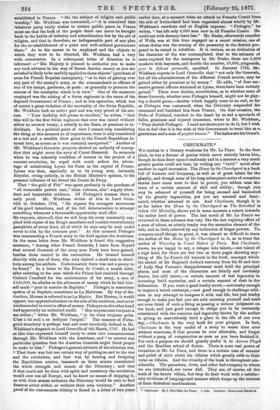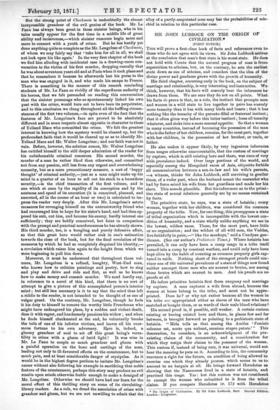CHECKMATE.'
WE confess to a literary weakness for Mr. Le Fanu. In the first. place, he has a flavour of genius which never entirely leaves him,. though he does draw upon it recklessly and in a manner a very much greater genius could not bear, by writing one " lurid" novel after another in rapid succession. The House by the Churchyard is a book full of humour and buoyancy, as well as of great talent for the- ghastly, and though none of his long subsequent series of sensation. stories have come near to that in power, you seldom miss the- trace of a certain amount of skill and ability ; though yon may he ashamed of yourself for being amused and fascinate& by his ghastly ingenuities, yet you are amused and fasci- nated, whether ashamed or not. And Checkmate, though it is- as far below the House by the Churchyard as The Betrothed is- below Old Mortality, shows yet in some measure a return towards the earlier level of power. The last novel of Mr. Le Fanu's we- reviewed in these columns was very like the last expiring effort of a man of talent, so utterly trashy was the sensation element of the- tale, and so little relieved by any indication of larger powers. To- compare small things to great, it was almost as difficult to trace the author of the House by the Churchyard in it, as to trace the author of TVa verley in Count Robert of Paris. But Checkmate shows, we are happy to say, a relapse into talent,—not talent of a high kind, for there are but two or three pages showing any- thing of Mr. Le Fanu's old humour in the book, amongst which. the sketch of Sir Reginald Arden's recovery from his fit and that of Lady May Penrose's disappointment must hold the principal. places, and most of the characters are faintly and carelessly drawn, but still talent,--a certain amount of real ingenuity in. inventing lurid mysteries, and a certain amount of dash in the• delineation. If you want a good trashy novel,—not trashy enough. to inspire a vexed contempt,—not good enough to challenge criti- cism or any attempt to compare it with real life, but just trashy enough to make you feel you are only amusing yourself and needs not even think of such a thing as passing a serious judgment on. the book, and just good enough to oblige you to be extremely entertained with the resource and ingenuity shown by the author• in giving so marvellously lurid a glare to the life of our own• day, —Checknia te is the very book for your purpose. In fact,. Checkmate is the very model of a story to waste time over- without weariness, if that process be ever allowable, and forget without a pang of compunction as soon as you have finished. it. For such a purpose we should greatly prefer it to Aurora Ploy& and the Braddon school of fiction. There is more real power.of invention in Mr. Le Fanu, and there is a certain ease of manner and polish of style about his villains which greatly adds to their value as villains. And the vivacity of the book is throughout con- siderable. The gamesters, .Jews, and other bad company to whom. we are introduced, are never dull. They are, of course, all the tools of the heroic villain, but they do their work with a satisfac- tory vividness of language and manner which keeps up the interest of their diabolical machinations.
• Checkmate. By J. Sheridan Le Fanu. 3 yols. London c Hurst and Blacket.a. But the strong point of Checkmate is undoubtedly the almost inexpressible grandeur of the evil genius of the book. Mr. Le Fanu has always been great in these sinister beings, who in his tales usually appear for the first time in a middle life of great ability and incisiveness,—which sinister rumours begin more and more to connect with a youth of crime. But he has hardly yet done anything quite so complete as the Mr. Longcluse of Checkmate, of whom we may fairly say that take him for all in all, we shall not look upon his like again.' In the very first chapter of the book we find him alluding with incidental ease in a drawing-room con- versation to the victim of his first murder, dropping casually that he was about seventeen years old and at Paris when it took place and that he remembers it because he afterwards lost his purse to the man who was engaged in it, and who made his escape to France. There is something in the manner of this remark reminding students of Mr. Le Fanu so vividly of the superfluous audacity of his heroes, that we felt persuaded on reading this conversation that the sinister personage who so spontaneously linked his own past with the crime, would turn out to have been its perpetrator, and to this conclusion we clung throughout all the baffling circum- stances of the first two volumes,—in spite even of the fact that the features of Mr. Longcluse's face are proved to be absolutely different and in some respects almost opposite in character to those of Yelland Mace who committed the crime. We felt the greatest interest in knowing how the mystery would be cleared up, but the profoundest faith that it would be cleared up so as to identify Mr. Yelland Mace and Mr. Walter Longcluse ; and our faith was not in vain. Before, however, the solution comes, Mr. Walter Longcluse has entitled himself to the still deeper admiration of the reader for his unfathomable criminal resources. His second murder, the murder of a man he rather liked than otherwise, and committed not from any passion, still less from any urgent and overwhelming necessity, but as a mere precautionary measure, a sort of happy thought' of criminal audacity,—just as a man might make up his mind in a quarter of an hour to sell out his stock in a hazardous security,—is the chief transaction of the first volume, and is one which at once by the rapidity of its conception and by the neatness and speed of its execution (it is conceived, planned, and executed, all in the course of an hour or two) is calculated to im- press the reader very deeply. After this Mr. Longcluse's astute measures for revenging himself on the untrustworthy friend who had encouraged him to hope for his sister's hand, and had then op- posed his suit, cut him, and become his enemy, hardly interest one sufficiently ; they are boldly conceived, but faint in comparison with the prompt and punctual murderousness he has already shown. His third murder, too, is a bungling and purely defensive affair, so that this great hero would rather sink in one's estimation towards the close of the book, but for the final revelation of the measures by which he had so completely disguised his identity,— a revelation which raises him again to the height from which we were beginning to pull him down.
Moreover, it must be understood that throughout these vol- umes, Mr. Longcluse is a refined, haughty, West-End man, who knows how to criticize paintings and poetry, how to sing and play and drive and ride and flirt, as well as he knows how to make money and commit murder. We need hardly say, in reference to a novel of this kind, that there is no sort of attempt to give a picture of this accomplished person's interior mind ; but still less necessary is it to say that the mind thus left a riddle to the reader, is not intended to be thought of as one of vulgar greed. On the contrary, Mr. Longcluse, though he feels it his duty to himself to remove the worthy little Frenchman who might have endangered his plans, by a sudden and violent death, does it with regret, and handsomely pensions his widow ; and when he finds himself checkmated at the end, he voluntarily breaks the toils of one of his inferior victims, and leaves all his enor- mous fortune to his own adversary. li,pre is, indeed, a gloomy grandeur of soul to set off this great being's versa- tility in crime with a gleam of lurid light ! It was wise in Mr. Le Fanu to couple so much grandeur and gloom with a painful operation on the bone and cartilage of the nose, leading not only to ill-favoured effects on the countenance, but to much pain, and at least considerable danger of erysipelas. As it would be in the highest degree perilous to imitate Mr. Longcluse's career without also following his example in sacrificing that noble feature of the countenance, perhaps this story may produce no evil results upon minds otherwise feeble enough to make a demigod of Mr. Longcluse. Otherwise we should have had our fears for the moral effect of this thrilling story on some of its circulating- library readers. As a rule, we dread the association of crime with grandeur and gloom, but we are not unwilling to admit that the alloy of a partly-amputated nose may bar the probabilities of mis- chief in relation to this particular case.



































 Previous page
Previous page